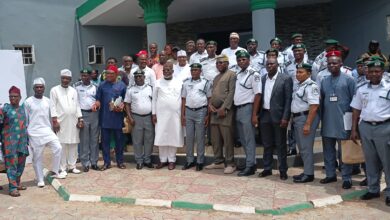
The Customs Area Controller of Apapa Port Command, Nigeria Customs Service (NCS), Comptroller Babatunde Olomu, has said that ‘Advance Ruling (AR)’ is a tool provided by the Customs Authority in advance of trade transactions which offers clarity on the classification, valuation and origin of goods, providing businesses with predictability in customs processes.
Comptroller Olomu lamented that many stakeholders in Nigeria are unaware of the existence of the AR or its benefits, leading to underutilisation.
“So I am using this medium to inform the key stakeholders especially importers and exporters of goods to make use of this mechanism in fast tracking their businesses,” he said.
Olomu who spoke at the 2024 edition of the Association of Maritime Journalists of Nigeria (AMJON) annual Maritime Finance Conference held on Thursday last week at the Sheraton Hotel and Towers, Ikeja, Lagos, further noted that the application process of AR could be cumbersome and time-consuming, thereby deterring potential applicants from using the process.
“Nevertheless, it’s worth inculcating into your (importers/exporters) schedule or business plans,” Olomu advised.
The Apapa Customs CAC who was represented by Evelyn Enweani, a Superintendent of Customs (SC), also observed that some Customs brokers may lack the necessary expertise to provide accurate and timely rulings on complex trade scenarios, but affirmed that customs officers are always on ground to assist the importers and exporters navigate the processes of AR for proper implementation.
Comptroller Olomu, further listed the challenges of Automated Economic Operator (AEO) programme as high cost of compliance, limited benefits and lack of harmonisation. This is as the Apapa Port Customs boss disclosed that Time Release is not insulated from challenges, saying hurdles that needed to be crossed includes; inefficient documentation, lack of technology and corruption.
To addresses these challenged and optimize the effectiveness of Advance Ruling, AEO and Time Release mechanisms, he proposed the following recommendations:
“Enhanced awareness campaigns- Conduct targeted awareness campaigns to educate stakeholders about the benefits of those initiatives.
“Simplified procedures- Streamline the application processes for Advance Ruling and AEO certification, reducing administrative burdens
“Capacity Building- Invest in training and capacity building for both customs officers to enhance their expertise in trade facilitation.
“Technology Adoption- implements modern technology solutions to automate Customs clearance processes and improve efficiency.
“Corruption prevention- strengthens anti-corruption measures within customs agencies to ensure transparency and accountability; and public-private partnerships- foster collaboration between customs authorities and the private sector to identify and address trade facilitation challenges,” Olomuh said.
He stated that the Nigeria Customs Service plays a vital role in facilitating international trade; saying “by effectively implementing Advance Ruling, AEO and Time Release Study/mechanism, the Service contributes to a more efficient, competitive, and prosperous trading environment.”
He added that addressing the challenges and issues associated with these initiatives is essential for optimizing their benefits and promoting sustainable economic growth.











